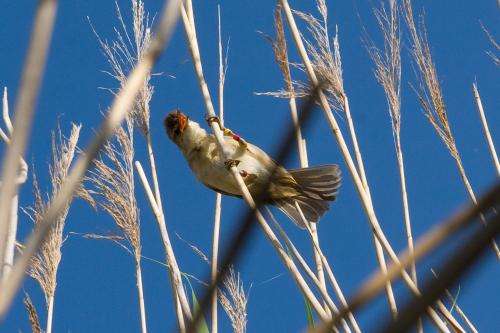January 23, 2015 report
Study shows chronic infection in certain birds shortens telomeres and lifespan

(Medical Xpress)—A team of researchers working in Sweden has found that one bird species suffers from a shortened life span when infected by the malaria virus. In their paper published in the journal Science, the team describes how they examined data from various studies of the great reed warbler, which occurred over a 25 year period, and what they found in doing so.
Great reed warblers are a migratory bird, some winter in Africa and nest in Sweden in the summer. Prior research has shown that while living in Africa, many of the birds contract malaria. In this new study, the researchers found that such infections tend to shorten the lifespan of the birds.
By studying bloods samples taken over the years, the researchers were able to see that malaria infections in the birds have been two phased—the first is an acute severe stage with typical symptoms that occur shortly after the initial infection. The second is a persistent, chronic phase where the birds demonstrate low-level symptoms. In addition to shorter life spans the researchers found that mothers that suffered chronic infections also tended to have fewer fledglings.
Closer inspection of the birds revealed that those who had suffered from chronic malaria infections also tended to have shorter than normal telomeres—the protective nucleleoprotein end caps found on chromosomes. Prior research has found a connection between telomere length and aging and also to some degenerative diseases—telomeres grow shorter as animals age (or when exposed to oxidative stress) during cell division, eventually leading to cell death. In this case, it appears that chronic infections had somehow speeded up the shortening process, thereby reducing the life span of the birds. The researchers also found that mother's with abnormally short telomeres due to chronic infection produced fledglings with shorter than normal telomeres, suggesting that chronic infections can impact at least one future generation.

The researchers do not know how such an infection can cause shortened telomeres, nor predict whether the same problem occurs in humans or other animals, but their study suggests that more research needs to be done to learn more about the long term effects of infections in general.
More information: "Hidden costs of infection: Chronic malaria accelerates telomere degradation and senescence in wild birds." Science 23 January 2015: Vol. 347 no. 6220 pp. 436-438 DOI: 10.1126/science.1261121
ABSTRACT
Recovery from infection is not always complete, and mild chronic infection may persist. Although the direct costs of such infections are apparently small, the potential for any long-term effects on Darwinian fitness is poorly understood. In a wild population of great reed warblers, we found that low-level chronic malaria infection reduced life span as well as the lifetime number and quality of offspring. These delayed fitness effects of malaria appear to be mediated by telomere degradation, a result supported by controlled infection experiments on birds in captivity. The results of this study imply that chronic infection may be causing a series of small adverse effects that accumulate and eventually impair phenotypic quality and Darwinian fitness.
© 2015 Medical Xpress




















